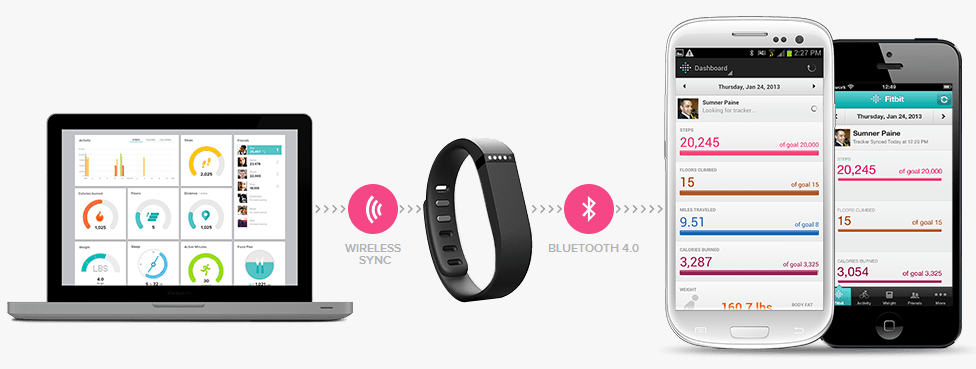The wearable technology market is exploding and we have seen a handful of very interesting health monitoring gadgets over the last year (Nike Fuelband, Lark Life, Fitbit, Withings Smart Activity Monitor, Shine).
Basis says the battery will last up to 4 days between charges which seems low. A longer life battery would be very desirable (ideally close to a week).
Basis was originally supposed to hit store shelved “early 2012” but obviously missed that target. In November 2012, Basis shared a blog post announcing that they were moving the device from the lab into field test mode, which is promising.
What is the Basis watch/band?
The Basis watch/band is a small watch like device that measures your level of physical activity. So far nothing too earth shattering. Bin order to differentiate itself in a very crowded market, it is adding additional capabilities to the Basis watch/band that are unique: will monitor perspiration, body temperature, blood flow and heart rate. It will then send all of this data to its website where it can be viewed and analyzed anyway you want. In addition to absolute numbers (total steps taken, total calories burned, etc) the web interface will attempt to discover patterns and share those with you. Things like when do you typically become more inactive?
From the information provided, the company has said they will release smartphone apps for the Basis watch/band however we haven't seen any product demoes yet so we have to wait and see.
Obviously the device is very clean and all of the monitoring functions are automatic. Although the company hasn’t provided the details of how it will track your sleep patterns, with all these sensors, it should (hopefully) be able to detect it automatically without the user having to press a button (like on the fitbit or Withings).
The Cons
Based on the information made available, here are the negative aspects of the product I see. Some of these may be addressed before the product is shipped.
Data will sync back to the cloud (and likely your smartphone) via bluetooth 2.1. Yes… you read it right, Bluetooth 2.1. What a disappointment here. I can’t understand why a device being released in 2013 doesn’t support the newer (backward compatible) Bluetooth 4 which is twice as energy efficient as its older brother.
Most of the competitors offer some kind of calorie counter to balance calorie inflows with expenditure however this isn’t something Basis has talked about at all. A Basis spokesman said their research shows users typically don’t use these food logging mechanisms so that is likely why it isn’t in the current iteration of the product.
Although they aren’t even taking pre-orders now, the original suggested price for the Basis was around $199 (real price may change when it is finally available). If they keep the $199 price range, it may be a tough sell in a market where most competitors are priced at $99. Are all of the added features worth an extra $100?
Wish List
- When the product is finally released, I hope they bring the product’s price closer to it’s main competitors ($99-$130 range).
- It would be great if they replaced Bluetooth 2.1 with the newer version 4.0 but I won’t be holding my breath.
- We haven’t seen the smartphone apps yet and I really hope these are properly designed to be clean, easy to use, useful and cross-platform (android and ios).
- Even if half of their customers don’t use food logging, I think it is an important feature and hope they add it.
- My last wish is that they adopt an open approach with the collected data and allow a customer to download it, share it or integrate it into their preferred health management platform (Runkeeper is one example).
- No news on availability yet but here is hoping it doesn’t take the basis team another year to bring this little device to market.
Pictures

 The back sensor
The back sensor









